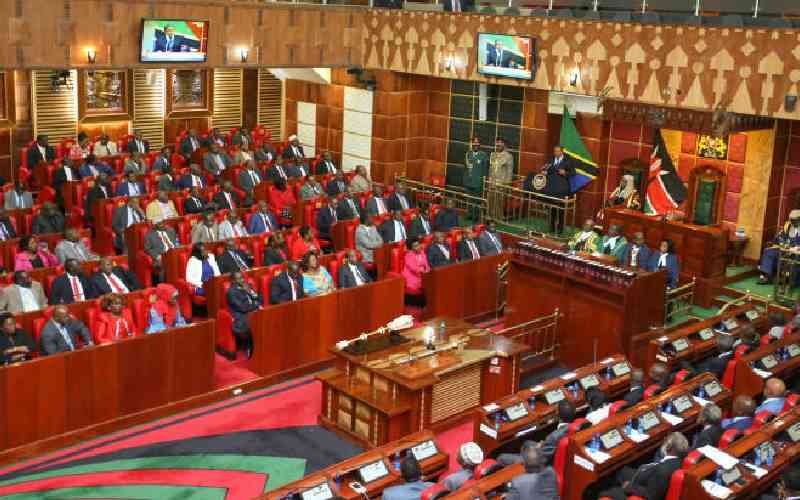 |
|
Devolution Cabinet Secretary Ann Waiguru addresses the Press at Harambee House, yesterday. Waiguru has defended the Executive’s absence from the devolution conference, saying they held their own stocktaking retreat recently. [Photo: John Njung’e/Standard] |
By Moses Njagih and Ally Jamah
Nairobi, Kenya: Governors will control Sh226 billion in the next financial year if Parliament approves proposals to increase by Sh36 billion the counties’ share of national revenue. The proposals are contained in the Division of Revenue Bill tabled in the National Assembly Thursday that slightly reduces the National Government’s share, perhaps as a strategy to appease county chiefs who have accused the Jubilee Government of fighting devolution.
President Uhuru Kenyatta’s Cabinet has snubbed a devolution conference that closes in Kwale County Friday after the Head of State criticised it as a waste of resources.
“We consider devolution as one of our key focuses and successes despite many accusations and claims to the contrary,” Devolution Cabinet Secretary Anne Waiguru told a news conference at Harambee House, Nairobi, Thursday while detailing the achievements of her docket.
Asked why she didn’t attend the devolution conference in Kwale, Waiguru said the retreat had nothing to do with the Executive arm of Government.
“We support the governors and their retreat. We have nothing against them or devolution.
“We think that it is important that every institution that is involved in devolution takes time to do self-reflection. It is well within their rights to conduct that retreat,” she said.
Waiguru added: “As an Executive, we have had our own stocktaking retreat recently to reflect upon our performance. We want to allow the Council of Governors to also conduct theirs. We see the meeting as stocktaking for them and not us. That’s why we haven’t attended.”
She downplayed concerns that the non-attendance by senior officials of the Jubilee Government is proof of bad blood between them and the county governments.
Two levels
The proposed allocation to counties in the 2014/2015 financial year reflects a Sh36 billion increase from the Sh190 billion that was shared between the two levels of Government in the financial year ending on June 30.
But while allocation to counties has increased, that of the national government, which last year stood at Sh808.4 billion, is reduced to Sh799.65 billion out of the estimated Sh1.02 trillion sharable revenue expected to be raised in the next financial year.
The allocation to the counties is also 43 per cent of the Sh529.3 billion in the 2009/2010 audited accounts approved by Parliament, which the Constitution stipulates be used in determining allocation to counties.
Article 203(2) of the Constitution requires that county governments be allocated not less than 15 per cent of the revenue raised, based on the last audited accounts approved by Parliament.
Of the Sh226.66 billion going to counties, Sh217.87 billion will be an equitable share, to be shared according to the constitutional formula, where 45 per cent is supposed to be based on population to counties, eight per cent on land area and poverty index at 20 per cent.
Stay informed. Subscribe to our newsletter
The county allocation also includes conditional allocations of Sh3.65 billion as allocations for rural electrification, Sh3.74 billion for Level Five hospitals and Sh1.4 billion for youth polytechnics.
The Bill says the allocations will ensure every county has money for development.
“The total resources available will fairly help counties perform their functions and meet required developmental needs.
“Any deficiencies will be considered under the auspices of the Intergovernmental Relations Act,” states the Bill.
The draft law also explains the reasons why the allocations to counties is less than the Sh279.1 billion proposed for the devolved units by the Commission on Revenue Allocation.
“The difference arises from the approaches used in determining the resources for counties. The resources as contained in the Bill are based on average revenue growth, while those by the CRA are based on forward estimates of expenditure for the coming financial year, as contained in the estimates of expenditure of 2012/2013, a period before counties were fully in place,” states the Bill.
The Council of Governors led by Bomet Governor Isaac Ruto (pictured) has repeatedly criticised President Uhuru Kenyatta’s Government for seeking to undermine devolution by allocating less money to counties than requested and conducting propaganda campaigns against them alleging misuse of funds.
Governors have called for a referendum to amend the Constitution to ensure that the allocation to counties is increased from the current minimum of 15 per cent to 40 per cent.
They also want all functions meant to be devolved to the counties to be transferred together with their financial allocation from funds budgeted in the next financial year.
Thursday, Waiguru said the Jubilee administration has already transferred functions to county governments, some of which were to have been transferred over a period of three years under the Constitution.
She said that where there were challenges in county governments handling the transferred functions, the national government offered them technical and financial support
Among other achievements of her ministry, said Waiguru, is the transfer of payroll to all the counties in January, saying it was within the stipulated time of six months.
She said the ongoing rationalisation of civil servants in the national and county government is set for conclusion by June this year and will reveal where there are too many workers doing the same functions and areas that are understaffed
“The audit against ghost workers is also ongoing and we expect to weed them out before June this year. The final findings of the audit will be given in an independent assessment,” she said.
 The Standard Group Plc is a
multi-media organization with investments in media platforms spanning newspaper
print operations, television, radio broadcasting, digital and online services. The
Standard Group is recognized as a leading multi-media house in Kenya with a key
influence in matters of national and international interest.
The Standard Group Plc is a
multi-media organization with investments in media platforms spanning newspaper
print operations, television, radio broadcasting, digital and online services. The
Standard Group is recognized as a leading multi-media house in Kenya with a key
influence in matters of national and international interest.
 The Standard Group Plc is a
multi-media organization with investments in media platforms spanning newspaper
print operations, television, radio broadcasting, digital and online services. The
Standard Group is recognized as a leading multi-media house in Kenya with a key
influence in matters of national and international interest.
The Standard Group Plc is a
multi-media organization with investments in media platforms spanning newspaper
print operations, television, radio broadcasting, digital and online services. The
Standard Group is recognized as a leading multi-media house in Kenya with a key
influence in matters of national and international interest.









